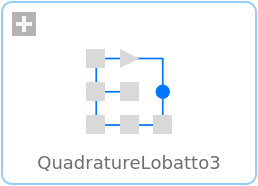WOLFRAM SYSTEM MODELER
QuadratureLobatto3Integrate function in a model |
|
Wolfram Language

SystemModel["Modelica.Math.Nonlinear.Examples.QuadratureLobatto3"]

Information
This information is part of the Modelica Standard Library maintained by the Modelica Association.
Technically, this example demonstrates how to utilize a function as input argument to a function in a model.
From a modeling point of view, the example demonstrates in very simplified way the basic approach to model distributed systems with the Ritz method.
The displacement field u(c,t) of a particle (where c is the undeformed position and t is time) is hereby approximated by space-dependent mode shapes Φ(c) and time-dependent modal amplitudes q(t), that is u = Φ(c)*q(t). When inserting this decomposition in the equations of motion and then integrating over all particles, terms such as ∫(Φ(c) dc)*q(t) appear, where the time-invariant integral term can be computed beforehand once with the Lobatto method. By this approach the partial differential equations are transformed to a system of ordinary differential equations.
Parameters (4)
| A |
Value: 1 Type: Real Description: Amplitude of integrand of s |
|---|---|
| ws |
Value: 2 Type: Real Description: Angular frequency of integrand of s |
| wq |
Value: 3 Type: Real Description: Squared angular frequency of q |
| s |
Value: Modelica.Math.Nonlinear.quadratureLobatto(function UtilityFunctions.fun7(A = A, w = ws), 0, 1) Type: Real Description: Time-invariant integral value |
